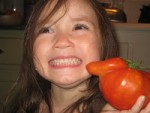First, a little background: why I would choose to read Richard Nelson Bolles’ What Color is Your Parachute? when I’m not actively looking for a job?
- I am 31 years old;
- I have no college degree;
- I have not held a real job in over a decade ( I am choosing not to count babysitting, occasional tailoring, helping out at the tux store, or “housewife”)
- My last real job was a photography shop, where I learned all sorts of useful things that have been rendered nearly, if not completely, obsolete by the takeover of digital;
- Therefore I have no truly marketable skills.
I have two more years before my youngest will be in school full-time, and at that point I will need to go full-time as well. What can I do to make myself more hireable before then? What am I good at? And given the choice, what sort of job should I look for?
What Color is My Parachute? delves into these questions and gives solid, concrete guidelines for searching for a job. It outlines ways to ferret out what skills you have, what skills you like to use (and where those two distinctions overlap), how to stand out in a crowd of resumes, the etiquette of job interviews. It stresses the importance of looking for the job that fits your life, even if you have to find a job “for now” to cover your bills. In fact, this book is so useful for your day-to-day pounding the pavement how-tos of the job hunt, that it proved to be less practical for my needs, which are more hypothetical. Definitely I will refer to this book when I have a start date looming in the near future, and I highly recommend it for anyone looking for a job, or considering a career change. That’s hardly new advice, of course; that’s how it wound up in my hands. However, since I can’t apply many of the applications to my current situation, I can’t give any sort of “it worked for me” testimonial.
What I can do is offer up the part of the book that lingered in mind days and weeks after reading it, so much so that I took the time to copy it down (hopefully accurately). It carries a distinct Christian flavor, which I’m not sure about, but the philosophy is sound.
What stuck with me was the concept that we should all be seeking out our Mission in life, and perform it with enthusiasm. Bolles points out that the word enthusiasm has its roots in the Greek entheos, which translates as “God in us”. Mission is defined in our trusty Webster’s dictionary as “a continuing task or responsiblity that one is destined or fitted to do or specially called on to undertake”.
Bolles then goes on to clarify:
Your first mission here on Earth is one which you share with the rest of the human race, but it is no less your individual Mission for the fact that it is shared: and it is, to seek to stand hour by hour in the conscious presence of God, the One from whom your Mission is derived. The Missioner before the Mission.
Second, once you have begun doing that in an earnest way, your second Mission here on Earth is also one which you share with the rest of the human race, but it is no less your individual Mission for the fact that it is shared: and it is, to do what you can, moment by moment, day by day, step by step, to make this world a better place…
Third, once you have begun doing that in a serious way, your third Mission here on Earth is one that is uniquely yours, and that is:
a) to exercise that Talent which you particularly came to Earth to use– your greatest gift, which you most delight to use,
b) in the place(s) or setting(s) which God has caused to appeal to you the most,
c) and for those purposes which God most needs to have done in the world.
Tweak the word “God” as needed to suit your views.
Am I living out my Mission in the job I hold now, as wife and mother and human being? I try.
- I try to find time every day to find beauty in the world, to find good in people, and to share these things with others.
- I try to only perform actions that are consistent with my beliefs.
- I try to use my influence as a mother to shape my children’s ideals and morals, because they will fall back on these in adulthood.
- I try to step back to allow them to form their own molds, not just conform to mine.
For now, this is my most important work, helping my kids develop into the adults they will become, so that they can exert their own influence and help improve this world we share. What work will I find when all my kids are in school, and they rely less on my guidance?
I don’t know. I don’t know. For now, if it’s OK with you, I’m focusing on today.
I know that many people feel that I am spoiled, that most people don’t have that luxury, to focus on today. I don’t know that it’s a luxury. More and more, I think that maybe it’s a necessity.
We know nothing of tomorrow;
our business is to be good and happy today.
-Samuel Taylor Coleridge











Leave a Reply